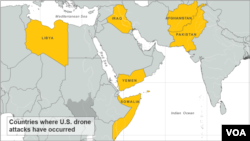ISLAMABAD —
Although the American media analyzed every gesture of the foreign policy debate between Democrat President Barack Obama and Republican contender Mitt Romney, Pakistan media on Tuesday had yet to feature the event that took place at dawn, Islamabad time.
Najim Rafique, director of Islamabad’s Institute of Strategic Studies said most Pakistanis felt not much would change, regardless of who took office.
“They are pretty sure that, whoever comes in, whether it is a Republican administration or a Democrat administration, it’s not going to make any difference to Pakistan," he said. "Approaches of both the candidates ... would remain the same as far as Pakistan is concerned."
Romney, highlighting Pakistan’s nuclear warheads, the presence of Haqqani and Taliban militants, and the dangers of becoming a failed state, emphasized the need to work with Islamabad.
Similarly, President Obama talked of the work his administration had done creating a partnership with Pakistan. Both comments reflected a subtle shift from previous critical comments on Islamabad’s failure to eliminate militants.
For Pakistan’s Senate Defense Committee Chairman Mushahid Hussain, the important take-away message is that Pakistan will remain at the top of the White House agenda.
"I was struck by the fact that both sides, and particularly Governor Romney, showed a very strong commitment to having a good relationship with Pakistan, underlining the importance of Pakistan in the context of the Afghanistan and the nuclear weapons issue," said Hussain. "And they both ruled out a relationship with Pakistan that [would be] termed a divorce."
Hussain also agreed with Rafique that both candidates made one message clear: Pakistan will have to re-evaluate how it combats extremists.
For Raza Rumi, director of policy at the Jinnah Institute, because neither candidate offered anything new — even in the way of aerial drone strikes — hopes of the Pakistani people remain unchanged.
“Whoever wins, Pakistanis would like an equitable and more harmonious relationship, and not the one which is based on mistrust, lots of negative media opinion and, unfortunately, drone strikes, which are angering the Pakistani people," he said, referencing CIA-led missile attacks on militants in northwest Pakistan, a contentious issue between Washington and Islamabad.
Pakistan rejects the strikes as illegal and a violation of its sovereignty.
There was little immediate response in neighboring Afghanistan on Tuesday. Most lawmakers were out on the annual Muslim Hajj pilgrimage and local TV stations had yet to react to the event.






